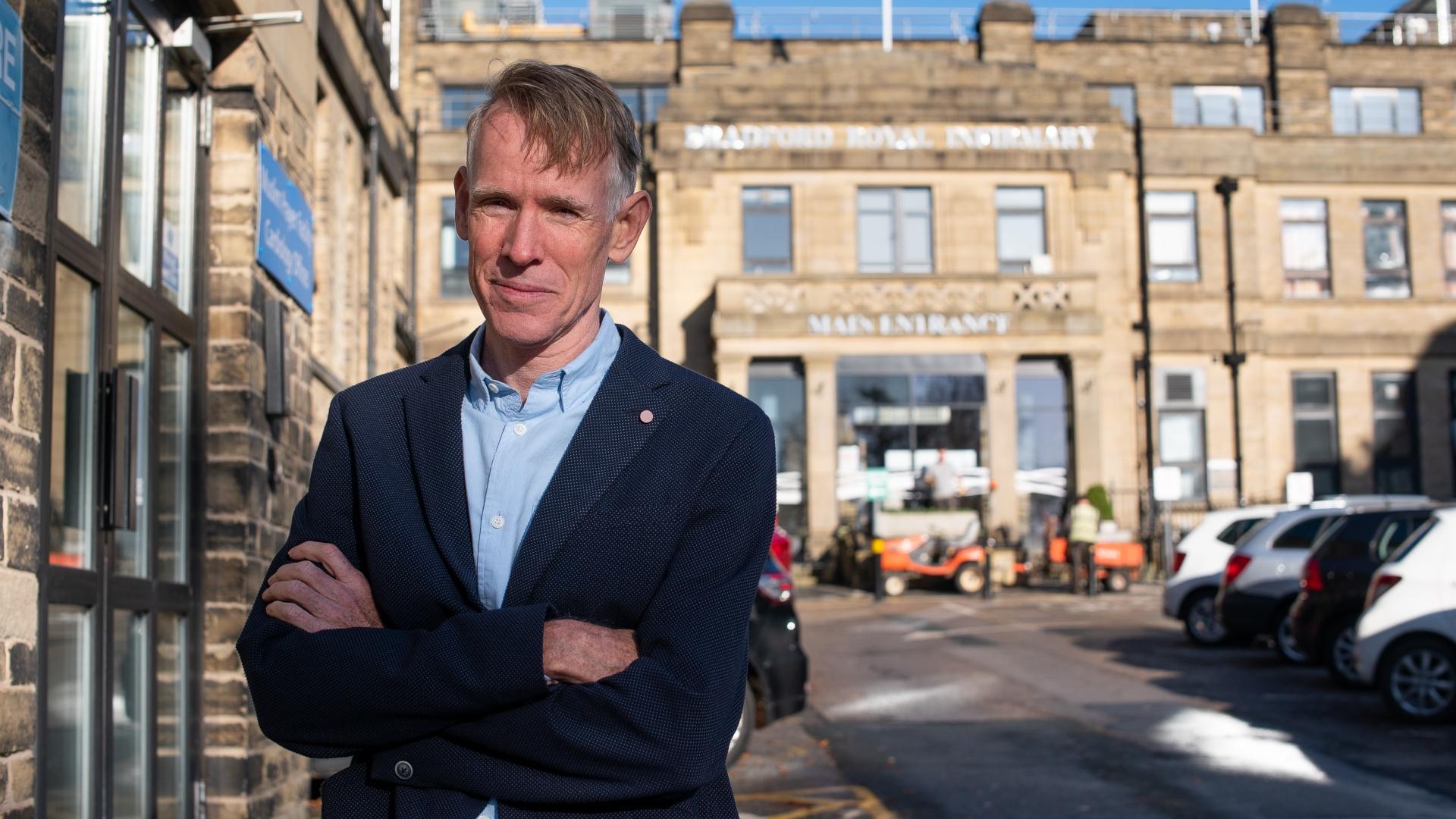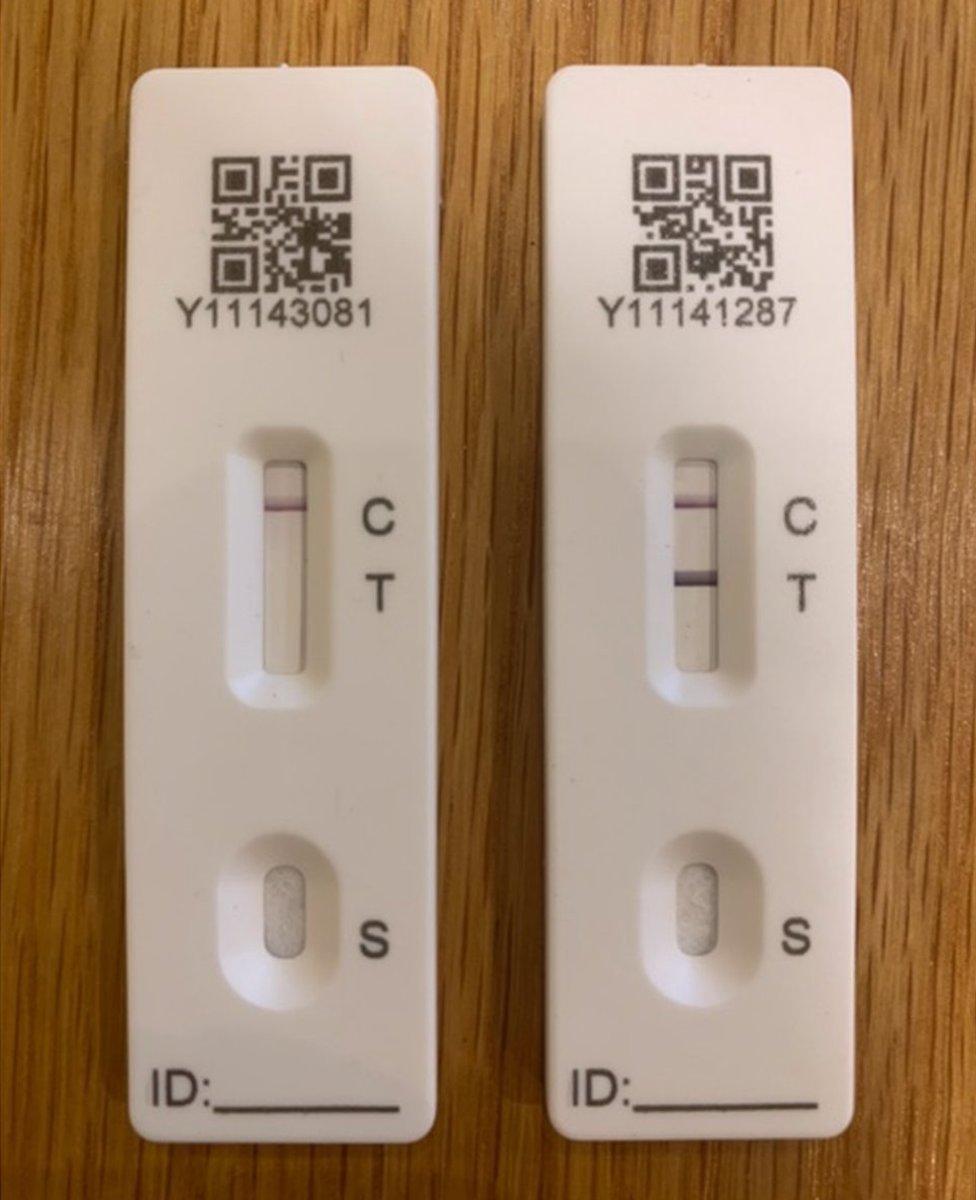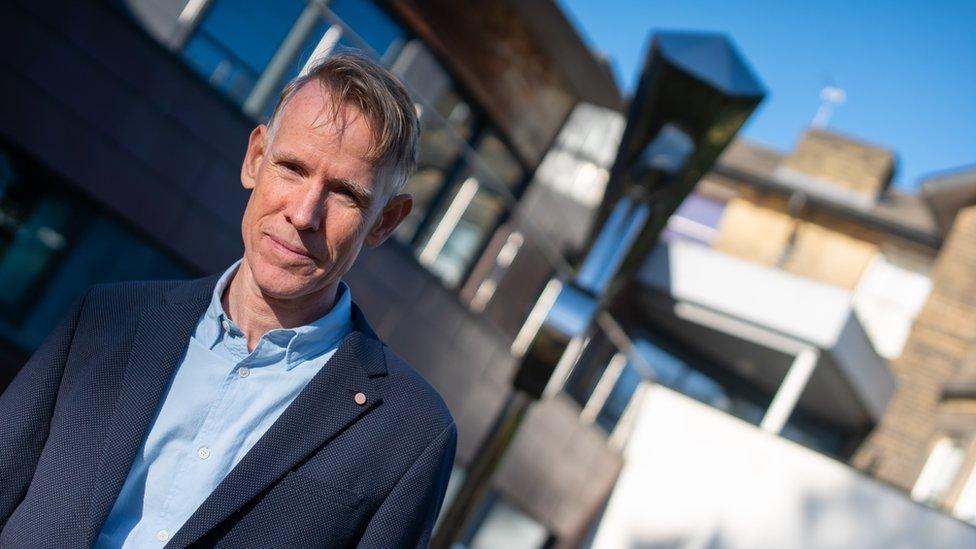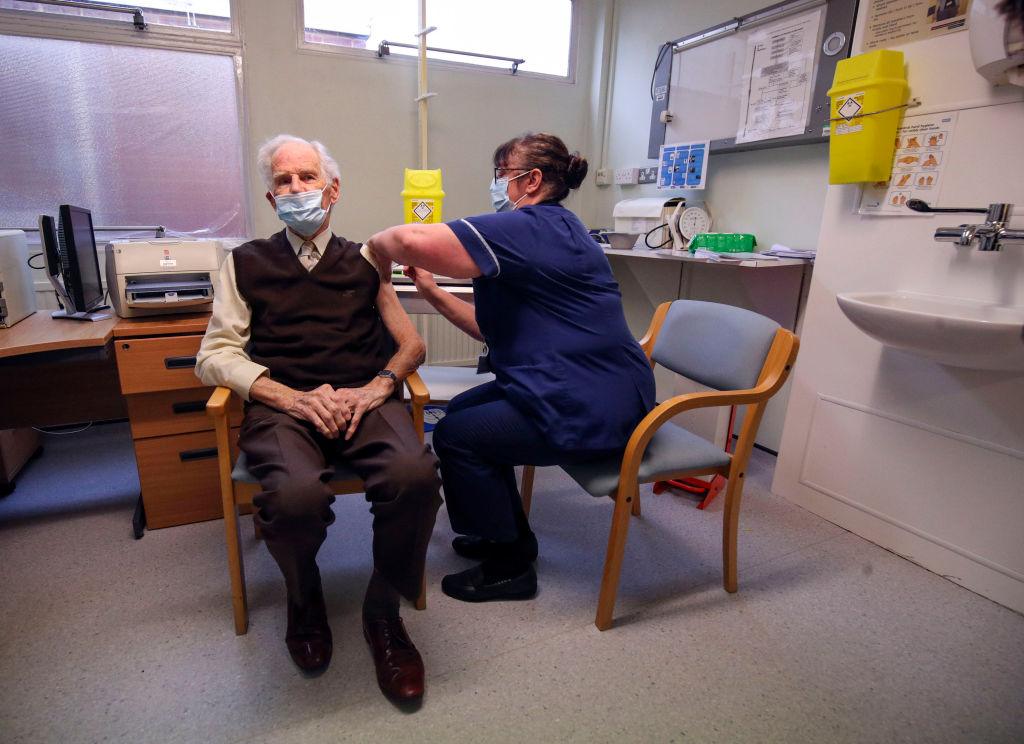Coronavirus doctor's diary: 'Have I got Covid for a second time?'
- Published

Dr John Wright of Bradford Royal Infirmary had tests in the summer which implied that he probably had Covid without symptoms early in the pandemic. But last week he had a swab test that came back positive. So were those earlier test results misleading, or has he now had it twice?
Last weekend I was due to visit my 89-year-old dad. I had seen him only once this year, during the summer lull, and we were both excited to be reunited. He had a heart attack during the first wave of the pandemic and is now about to have cancer surgery during the second wave, so my visit was a precious one. The omnipresent virus, however, had other plans.
All NHS front-line workers now self-test for Covid-19 twice weekly, to screen for asymptomatic infection. So on Thursday evening, the day before my visit, I undertook the self-testing ritual - scraping the delicate swab at the back of my throat to elicit a gag reflex, then twiddling it high up in each nostril, dissolving it in buffer solution and then anointing the lateral flow kit. A hollow emptiness grew as the positive line grew stronger. I didn't believe it. In denial, I quickly repeated the test - but with the same result. The next morning I had my PCR swab and at 04:50 on the Saturday was notified that this too was positive.

A negative test on Tuesday last week - and on Thursday a positive one

The visit to my dad was now definitely off and I began a 10-day isolation, together with my wife, Helen. Also a front-line medic, Helen had been vaccinated with the Pfizer vaccine on Thursday, at almost exactly the same time as my two positive self-test results. Immunity with the Pfizer vaccine takes off reasonably quickly, with some protection occurring by day 12 after the first dose, but the full immune effect isn't felt until a week after the second dose.
So here we are: I have the SARS-CoV-2 virus and she has the SARS-CoV-2 vaccine - disease and cure, villain and hero, yin and yang living under one roof. But she still needs to isolate as she could be infected by me before her immunity builds up.

One reason my result was such a surprise was that I thought I had already had Covid-19. Having worked at the hospital during the first wave, when the virus was circulating at such high levels, it seemed unlikely that I could have avoided it. Many of my colleagues fell ill with Covid-19 in those early weeks, some of them seriously, so I assumed that I had just dodged the bullet and had the virus without symptoms, which is not unusual.
At that stage we had no way of testing for infection. Later, when antibody testing became available as a way of revealing a historic infection, I had a positive test result. That positive result was admittedly followed by two negative antibody test results, but this could have been due to the fact that Covid antibodies fade quite quickly.
When I had a T-cell test and it came back positive, that seemed to clinch it. I had been exposed to the virus, I had had a positive antibody test and a positive T-cell test; it seemed likely that I had had Covid-19, and I felt reassured by this. A number of my colleagues who had negative antibody tests and hadn't been fortunate enough to have a T-cell test, remained nervous about the inevitable risk.
But now I definitely have Covid-19. On top of the PCR test, I have symptoms, including anosmia (loss of smell).
So have I had it twice in nine months?

Front-line diary

Prof John Wright, a doctor and epidemiologist, is head of the Bradford Institute for Health Research, and a veteran of cholera, HIV and Ebola epidemics in sub-Saharan Africa. He is writing this diary for BBC News and recording from the hospital wards for BBC Radio.
Listen to The NHS Front Line on BBC Sounds and the BBC World Service
Or read the previous online diary entry: 'Covid killed my wife - so I'm taking part in a vaccine trial'

Cases of people having Covid-19 twice appear to be rare. The first confirmed case was recorded in August, when a patient in Hong Kong tested positive for a second time.
Since then, a Dutch news agency has counted only 27 other cases of reinfection from Qatar to Brazil, external. Although it's likely that many cases have gone unrecorded this is an extremely small number, which tends to suggest it doesn't happen often.
My first instinct was therefore to conclude that I didn't actually have Covid in spring and that my first antibody test was a false positive.
To seek advice, I rang my colleague Prof Paul Klenerman, from the University of Oxford, who is leading one of the major national immunity studies on Covid-19. It was as part of his research that I had one of my two subsequent negative antibody tests and my positive T-cell test in June.
"It's really interesting," he explained. "Your antibody results were negative but they could have faded naturally by the time we tested you. However your memory T-cell assay was very suggestive of SARS-CoV-2 infection."
I had begun to wonder whether the T-Cell test was in fact registering my immune system's memory of infection by a different coronavirus, perhaps the common cold, but Prof Klenerman thought it was too early to draw this conclusion.
He emphasises that we don't yet know how long immune protection will last, either for those who have had Covid-19 or those who have had the vaccine. His research should fill in the gaps.

An elderly man, Brian Horne, is vaccinated in a GP's surgery in Chalfont St Peter
In my case, Prof Klenerman and his team will arrange for follow-up testing, to investigate further.
If I have been reinfected, one possibility is that I have picked up the new variant of the SARS-CoV-2 virus circulating in the UK, the "escape mutation" that we have heard about in the last few days.
I quite like the idea of being a scientific curiosity and I will keep you posted if the answer becomes clear.
Let me take you back to my unexpected positive self-test. There is much debate in the medical journals about the evidence for rapid, asymptomatic, mass testing. If a negative test provides false reassurance it could have unintended consequences, as was pointed out in an opinion piece in the British Medical Journal, describing the programme as a "costly, underdesigned, under-evaluated mess, external". As an epidemiologist I shared some of this scepticism and thought the £100bn bill seemed excessive.
However, this week it may well have saved my dad's life.
And now that he has had the vaccine, my visit to see him may be back on - if restrictions on travel and mixing permit it - early in the New Year.
Follow @docjohnwright, external and radio producer @SueM1tchell, external on Twitter